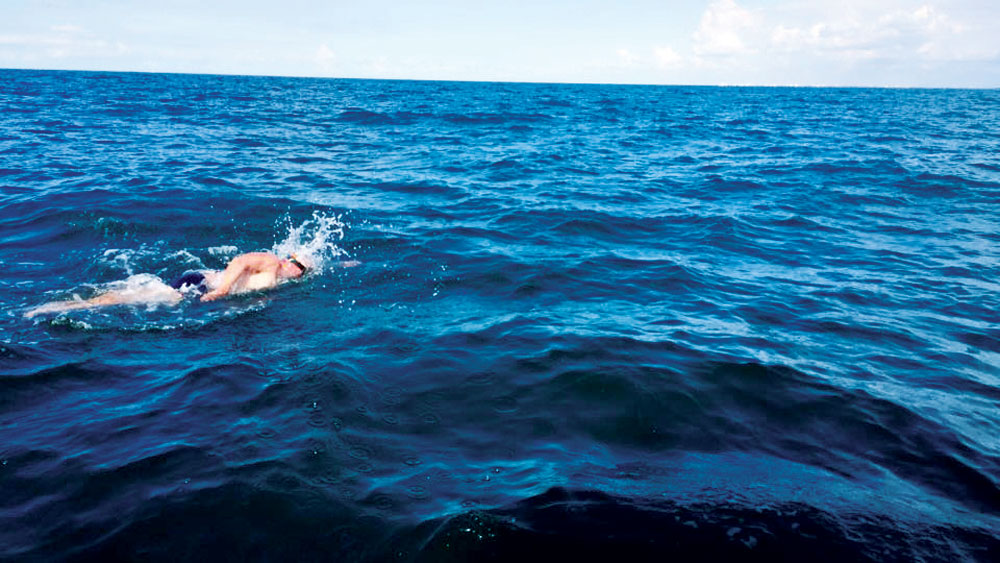
Stapleton resident Lee Ferguson swims strong at the end of the northeast lane, nearly in French inshore waters.
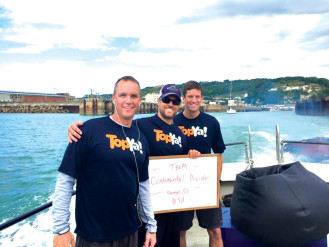
Lee Ferguson, Micha Hanson and David Tonini boat to the take off point near Dover, England to swim the English Channel.
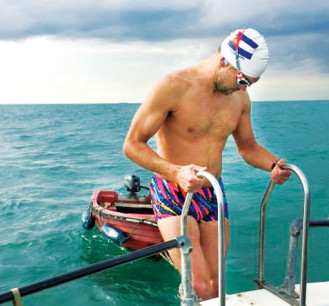
Micha Hanson gets off the boat to swim a leg of the channel relay.
The waiting is the hardest part—so goes the hit song by Tom Petty. It’s a sentiment that consumed three Stapleton men, Lee Ferguson, Micha Hanson and David Tonini, in the days before Thursday, July 30, 2015, as they stood on the beach looking at the turbulent sea. They had been waiting 10 days for the cyclonic winds to subside so they could make their attempt to swim a three-man relay across the English Channel.
“I sat on the beach thinking I was going home [without swimming],” recalls Tonini, 39, about the day before the swim. An attorney, he had a trial starting and couldn’t wait any longer for the weather to improve. He began encouraging Ferguson and Hanson to make a go of it with a two-man relay. Ferguson and Hanson felt apprehensive about changing formats, so they started posting queries on discussion boards, looking for a third swimmer if they were cleared to go. After all, they’d been planning since 2013 and had spent a full six months lining up a registered pilot and boat. They’d logged tens of thousands of meters in training sessions. They’d completed more than 12 grueling cold-water swims in Colorado reservoirs and lakes. Would Mother Nature play her trump card and thwart all their efforts?
Ferguson, Hanson and Tonini, who dubbed themselves the Continental Divide team, had to make the final determination when the weather was acceptable to make their attempt. The windy conditions finally calmed, and on Wednesday, July 29 a local team from Dover, who was slotted before the trio, ceded their spot for the next day to the waiting swimmers from Colorado.
So, on Thursday, July 30, Ferguson, Hanson and Tonini finally dove into the English Channel. They not only finished their channel swim, they set a world record with their time of 10 hours and 3 minutes for a three-man relay. They had navigated two years of planning, logistics, training and the added uncertainty of whether they could even attempt a swim to finally make the crossing and crush the record in the process.
Hanson takes all the blame for suggesting that he and his two buddies swim the channel. They were all lifelong swimmers, having swum in college and for several years in the Stapleton MCA Masters summer program. He brought it up over beers one night. Ferguson and Tonini laughingly replied that if Hanson did all the planning, they’d show up for the swim. They should have known then that he was crazy enough to follow through.
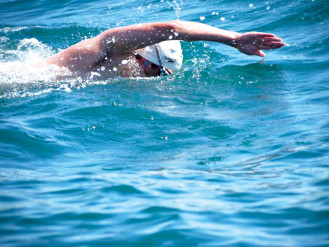
David Tonini swims a leg of the relay.
To put it into perspective, swimming the channel is considered the Mount Everest of open-water swimming feats. There are longer and colder swims, but it’s considered the most difficult for a variety of reasons. The tides whip swimmers all over the place, sometimes adding miles to the 21-mile swim, in which wetsuits are prohibited. The channel is one of the busiest shipping lanes in the world, with 600 tankers passing through and 200 ferries and other vessels crossing each day. Swells can reach more than six feet. Add in the cold water and the inevitable waiting that comes with these crossings and their achievement becomes a mental and physical feat that most would never dream of attempting.
Ferguson says the cold-water training was significant. The Channel Swimming Association (CSA), which observes and authenticates cross-channel swims in the Strait of Dover, requires swimmers to log at least one two-hour swim below 60 degrees with a witness. The trio did more than 12 swims below 65 degrees. Hanson, who gained 10 pounds of insulation by drinking three protein drinks a day, also endured regular cold showers and ice baths to increase his tolerance. Still, he suffered symptoms of hypothermia after their May 1 swim in a bone-chilling Chatfield Reservoir. It was 55 degrees.
“I have very distinct memories of our 56- and 57-degree swims being very miserable,” relates the 47-year-old Ferguson, who opted for the unconventional nutritional approach of drinking more beer to maintain his weight.
Sitting around the cozy confines of The Bistro in Stapleton recently, all three swimmers admit they had doubts they could make their crossing after that Chatfield swim. Ferguson relates that it was so cold he could “feel Micha’s body heat” as his fellow swimmer waded by him in two feet of the icy water at the start of that swim.
“It’s all I could think about,” says Hanson, who poured over data on average temperatures and tried to extrapolate the temperatures they’d likely encounter. His fears about the cold and the possibility of a night swim—a regular occurrence for channel swims due to tides—were relieved somewhat by the CROWS (Colorado Represents Open Water Swimming). As they “chased cold water” throughout the spring, the trio would routinely meet members of this veteran group of marathon swimmers who always had encouraging smiles and much-needed advice.
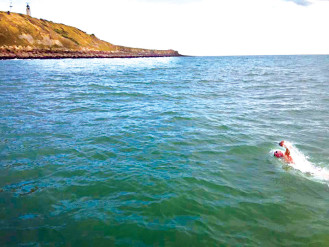
Micha Hanson approaches France as the team successfully completes “The Big Channel Swim.”
But when splashdown finally came, the cold was hardly a factor. The water temperature on July 30 was 61 degrees—still cold, but not mountain-lake cold. “It’s a bit lumpy today,” remarked their boat pilot, Eric Hartley, about the residual waves from the previous days of high winds. Tonini says there were swells approaching four feet. But the team wasn’t likely to be deterred at this point. In fact, the long wait and the uncertainty seemingly fueled the adrenaline required for a record-breaking swim.
In accordance with CSA rules, each member of the relay must swim for a minimum of 60 minutes each time he enters the water and be out of the water by the 65-minute mark. The team members transition by having the new swimmer enter the water and overtake the prior swimmer in that five-minute interval. As the Continental Divide team neared their landing point, France’s Cap Gris Nez, the boat had to anchor some 200 yards from land due to rocky shoals. Ferguson and Tonini were on board scrutinizing the clock. Hanson, who was in the water nearing dry land, had to finish under the 65-minute maximum per swimmer. Otherwise, Ferguson would have to swim from the boat, overtake Hanson and complete the swim, adding precious minutes to their time. With barely audible screams from his teammates to swim faster, Hanson touched down on French soil 93 seconds before his maximum swimming time was up.
Elated, relieved and tired, the three rode back in the boat to Dover. A text from Ferguson’s wife brought the astounding news that they had broken the record for a three-man relay, but this wasn’t confirmed by the CSA observer who accompanied the team on the boat until Hanson got a phone call as he was boarding the plane home. The former record held by a three-man relay was 10 hours 45 minutes. The Continental Divide team beat it by 42 minutes.
Back in Dover, the three friends ended their journey just how it began—by enjoying a few pints. This time, they sat at the legendary White Horse Tavern, where channel swimmers adorn the walls with their sentiments and times. Hanson may visit again someday, as he’s thinking about a solo swim. His teammates will likely be there in spirit. Both Ferguson and Tonini feel one Mount Everest of swims is plenty to satisfy their thirst for adventure.
An avid swimmer, Molly Worth lives in Stapleton and is a freelance writer



Thanks for covering the boys’ achievement Molly.